
If you’re hosting a company event, exhibition, conference, or product launch, you might be wondering: What does an event planner do in the Philippines, anyway? Understanding what an event planner does in the Philippines can help you find the appropriate professional to turn your dream into reality and ensure your event is a seamless, hassle-free experience.
Whether you employ an event planner in the Philippines or choose to be one, you must be aware of the types of services and skills necessary in successful event planning.
Learning about the Role of an Event Planner in the Philippines
A Philippine event planner is responsible for planning, coordinating, and producing events of any size. From concept development to post-event review of the event once finalized, event planners manage the big picture as well as all the little things. Their ultimate aim is to deliver memorable experiences while making sure that everything is in budget and on track with the timeline.
This is a full list of their key responsibilities:
1. Event Conceptualization and Planning
Client Consultation and Event Design
Event planners begin with a client session to determine purpose, theme, target market, and desired result. Whether a Batangas business event or Metro Manila technology exposition, the client’s vision must be clearly understood.
Theme Building and Mood Boards
They come up with creative concepts, theme concepts, and event branding concepts that align with the client’s objectives.
2. Venue and Vendor Coordination
Venue Selection and Booking
Event planners research and recommend suitable venues based on budget, size, location, and theme. They negotiate and acquire deals.
Vendor Sourcing and Management
From food and speakers to ice breakers and giveaways, event coordinators coordinate with their favorite vendors to ensure the event goes off without a hitch. They also manage vendor contracts, payment, and timelines.
3. Operations and Logistics Management
Event Logistics
Organizers make arrangements for transportation, accommodation (if necessary), seating, guest list, permits, security, and technical needs.
Timeline and Scheduling
A timeline of the event is created chronologically to schedule all the moving parts. Planners track deadlines, delivery, and rehearsals.
4. Budgeting and Financial Management
Budget Preparation
Event coordinators help clients use resources in an effective manner. They estimate costs, create budgets, and recommend cost management alternatives when needed.
Cost Monitoring
They track expenses while planning to maintain the event within budget without sacrificing quality.
5. On-Site Event Implementation
Event Setup and Supervision
Planners are the first and last to arrive at the event location on the event day. They supervise the installation, handle staff, and ensure all the parts are positioned in their correct locations.
Troubleshooting and Contingency Planning
A Professional Event Planner Philippines has experience handling last-minute changes and promptly fixing problems without disrupting the flow of the event.
6. Stakeholder and Client Communication
Transparency Communication
Event planners update clients at every turn, offering advice and answering questions promptly.
Customer Service Excellence
They aim to exceed clients’ expectations, which normally leads to repeat business and word-of-mouth—a powerful driver in the Philippine events industry.
7. Post-Event Activities and Evaluation
Feedback Collection
After the event, coordinators gather feedback from the respondents or interviews to measure levels of satisfaction quantitively.
Performance Review and Reporting
They analyze outcomes, compose event reports, and provide recommendations for improvement in the future.
Frequently Asked Questions (FAQs)
✅ What is the cost of hiring an event planner in the Philippines?
Fees vary according to the type of event, venue, and number of guests. Some event coordinators in the Philippines charge a flat rate, and others charge a percentage of the total event cost. A common range is ₱100,000 to up.
✅ What types of events do Filipino event planners usually organize?
Some of the most common events include B2B Meetings, corporate events, product launches, trade shows, expos, and conferences.
✅ Why do I have to employ an event planner rather than plan the event by myself?
It saves you time, stress, and enables you to have a professional, hassle-free event. Their relationships, experience, and knowledge can literally save you money from costly mistakes.
Conclusion
The job of an Event Planner Philippines professional goes far beyond mere venue reservation or vendor management.
They oversee the entire event life cycle—vision and planning, right up to execution and post-event assessment.
If you desire to have an event that’s memorable, well-organized, and hassle-free, one of the best things you can do is to engage a professional event planner. Whether it is a B2B meeting in Cebu, a business conference in Makati, or an exhibition in Davao, having an experienced Event Planner Philippines partner is invaluable.